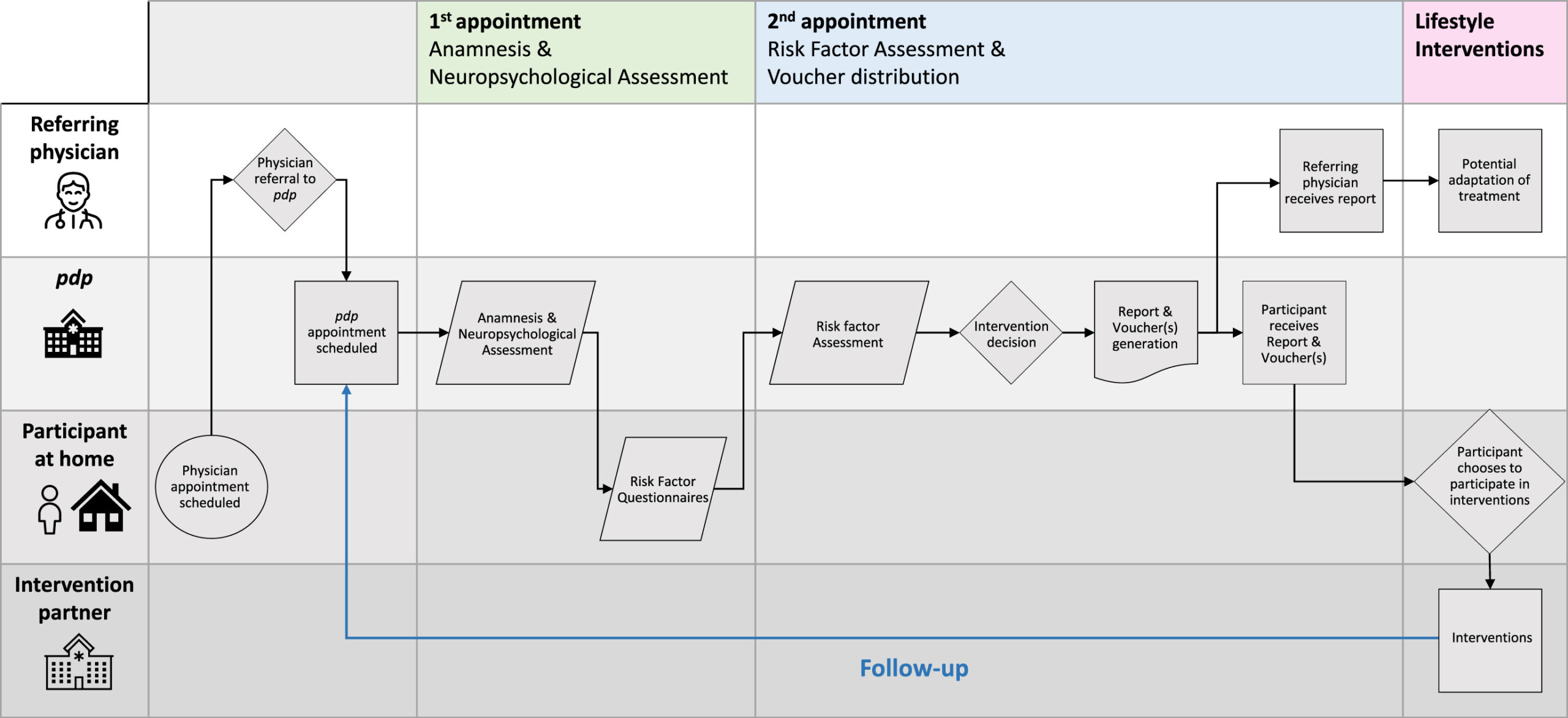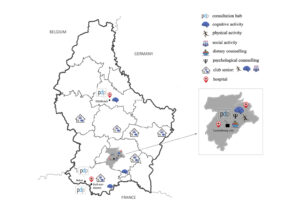As life expectancy rises and societies continue to age, we are facing complex challenges linked to age-related illnesses. In 2018, the World Alzheimer Report estimated that around 50 million people worldwide were living with dementia. In Luxembourg, the number of people affected will increase substantially over the coming decades as the population aged over 65 is expected to nearly double. Consequently, prevention strategies are of utmost importance to reduce the individual risk and the high societal burden caused by neurodegenerative diseases leading to dementia.
A nationwide programme and a personalised approach
This is where the “programme dementia prevention (pdp)” comes into play. Launched in its current form in February 2018, with the support of the Ministry of Health, it aims to prevent or at least delay dementia in an at-risk population through targeted multiple lifestyle changes. “In the face of our aging population, the personalised dementia prevention programme (pdp) is a testament to Luxembourg’s commitment to enhancing healthcare and mitigating the impact of age-related illnesses. We are proud to collaborate with the University of Luxembourg on this transformative project, leveraging collective expertise to build a healthier and more sustainable future for Luxembourg,” says Martine Deprez, minister of Health.
The uniqueness of this nationwide program resides in its personalised approach: it offers interventions tailored to each participant. Although the importance of early dementia prevention is well established, guidelines for the creation of such programs, integrated into a real world healthcare environment, are missing. For this reason, the pdp team has recently published an article in the Journal of Alzheimer’s Disease, a key scientific journal in the field of dementia, to share their expertise and the methodology they successfully implemented in Luxembourg. “Our experience in developing this integrated care network for personalised prevention has yielded valuable insights and may contribute to rolling out similar concepts in other countries,” explains Prof. Rejko Krüger, coordinator of pdp, principal investigator of the Translational Neuroscience group at the Luxembourg Centre for Systems Biomedicine (LCSB) of the University of Luxembourg, head of Transversal Translational Medicine at the Luxembourg Institute of Health (LIH) and neurologist at the Centre Hospitalier de Luxembourg (CHL).
Research supports the importance of prevention
During the last two decades, extensive research has been conducted to study risk factors for cognitive decline. Scientists have identified twelve key factors proven to influence the risk of developing dementia later in life: the level of education, hypertension, diabetes, physical inactivity, overweight, smoking, excessive alcohol consumption, traumatic brain injury, air pollution, hearing loss as well as depression and social isolation. These are modifiable risk factors, meaning actively targeting them through specific lifestyle changes could reduce the risk of developing dementia by approximatively 40%. Studies have also shown that multi-domain interventions are most effective. These results indicate that cognitive functions may be maintained in older at-risk adults when they benefit from a combination of cognitive training, exercise, diet counselling and vascular risk management.
A well-defined process to act on a combination of risk factors
pdp was developed to translate these research results into a prevention programme working in a real-world healthcare setting. It targets people with an objective or subjective cognitive impairment, and is designed to offer them early prevention through a blend of personalised and cost-free lifestyle interventions.
An extensive neuropsychological evaluation – focusing on cognitive functions such as memory, attention, and language – and a risk factor assessment are conducted for each participant. Following these steps, the memory coaches establish a tailored intervention program for the participant, who then receives vouchers giving access to the recommended activities. These range from cognitive training and physical or social activities to dietary consultancy and psychological health counselling, depending on their risk factors.

First results show success of the programme
Over the past years, 450 people have been screened. Among them, 425 participants, who met the inclusion criteria, are now part of pdp and will be invited for yearly follow-up visits. Throughout the country, more than a hundred physicians – including general practitioners, neurologists and geriatricians – have already referred their patients and continuous referrals are leading to a constant increase in the number of initial appointments. These figures demonstrate that pdp was able to reach its target population and that medical professionals in Luxembourg recognise the value of the activities offered as part of the programme.
Several aspects are key to this success. First, pdp relies on a close collaboration with referring physicians and a multidisciplinary network of healthcare providers. A cohesive team has designed the programme with the well-being of the participants and accessibility in mind. pdp is free of charge and has recruitment hubs spread throughout Luxembourg facilitating access for all. Additionally, procedures are adapted to participants who encounter cognitive difficulties, with for example frequent reminders before appointments and the use of visual aids when communicating the results of the assessments. Finally, the list of offered activities grows constantly so that participants can choose among a broad range, to better fit their needs and help with adherence to the suggested lifestyle changes.
“Our experience in the framework of pdp not only informs research in the field of personalised dementia prevention, especially on mitigating risk factors, it also demonstrates the feasibility of prevention programs based on personalised lifestyle interventions,” concludes Prof. Rejko Krüger. “To further raise awareness about dementia prevention, we will next launch a smartphone application that will help people, including younger adults, to identify potential risk factors for dementia and to adopt a healthier lifestyle.”
Reference
Programme Dementia Prevention (pdp): A Nationwide Program for Personalized Prevention in Luxembourg, Valerie Schröder, Amna Skrozic, Dorothee Erz, Anne Kaysen, Joëlle Fritz, Joao Loureiro, Deborah McIntyre, Laure Pauly, Jennifer Kemp, Sabine Schmitz, Sophie Wagner, Margarita Reyes, Ruxandra Soare, Venkata Satagopam, Carlos Vega, Piotr Gawron, Kirsten Roomp, Patricia Martins Conde, Jochen Klucken, Sebastian Köhler, Tobias Hartmann, Richard Dodel, Anja Leist, Elke Kalbe & Rejko Krüger, Journal of Alzheimer’s Disease, 16 January 2024. DOI: 10.3233/JAD-230794
